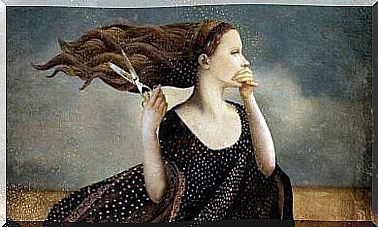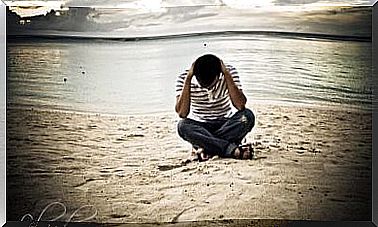Nothingness: Childhood Depression Through “The Neverending Story “
Each of us has various books or films that we remember with particular affection and which, in some way, have marked our childhood. Today we want to talk to you about “The Neverending Story”. Reading it again, one can understand that it is a book that reflects childhood depression and that has nothing as its protagonist.
Through nothingness as a metaphor for the loss of imagination, the loss of innocence in the adult world, this story makes us understand that growing up does not necessarily imply stopping dreaming. If we stop dreaming, the Kingdom of Fantasy will cease to exist, even if, with a little hope, everything can arise again.
For this reason, the void can be seen as a curious way of explaining to children what depression is. But that’s not the only way used in the book and film. We warn our readers that, starting from this moment, the article will delve into aspects of the book and the film and, therefore, contains spoilers.
The quagmires of sadness
Bastian, the protagonist of the book, is a child who is deeply suffering from the disappearance of his mother. In addition, he has stopped doing things that he previously found enjoyable and that strengthened him, such as swimming or horseback riding, and is bullied at school.
The only way he has to escape from that terrible world, then, is to use his imagination. For this reason, when he tells the story of the book, the book of which he himself constructs the story, he brings the reader closer to a group of fantastic beings who possess everything. A whole that, suddenly, was taken away from nowhere. Just like him, the characters have lost the serenity of their peaceful life. A life Bastian lived when his mother was still there, before something happened to which there is no explanation.
Nothingness is that terrible emptiness that grows more and more, making what is lost greater. Nothing destroys everything. It is nothingness because it cannot be replaced by anything else, it is only pain. Only the bravest warrior in the Kingdom of Fantasy can fight against nothing: Atreyu. To do this, he travels throughout the kingdom, until he finds the answer in the quagmires of sadness.
The quagmires of sadness are the last destination, the last hope. Here is Morla, the wisest being in Fantasia, but the marshes are a great danger, because those who cross them run the risk of being pervaded by sadness: if this happens, they gradually sink into the muddy waters.
Here is a beautiful metaphor extrapolated from the dialogue between Bastian and Morla: don’t get carried away by sadness, this makes you sink; you have to keep fighting against adversity. However bad you feel, don’t give up, otherwise you will sink. And, above all, do not get carried away by those who do not have the joy of youth and do not stop to contemplate it.
Nothingness as an inner hell
Then nothingness, darkness, takes shape, transforming into a wolf called Mork. A wolf chasing Atreyu, to prevent him from fulfilling his mission. A wolf that shows up only when Atreyu has lost all hope.
Thus nothing appears, as the protagonist’s inner hell. A hell that, if you get too close, makes you sink, destroys you; but Atreyu is a warrior who does not give up without a fight. However, he doesn’t know how to fight against the biggest of his problems, nothingness.
And he cannot fight against nothingness because he cannot cross the frontiers of Fantasia and communicate to those who are outside, the adults, what he really needs. Because for a child, coping with real pain, as adults do, is very complicated and, for this reason, it creates its own universe.
A little hope can change everything
In the end, when nothing is about to take everything away, Bastian realizes that he is the protagonist of his story. He understands that he was sad, that after his mother’s death it was he who was sunk in the quagmire of sadness. It was he himself who had lost his wonderful world and it was the adults, his father and the owner of the bookshop, those who did not want to listen to him and, like Morla, asked him to stop being a child, to use his imagination to land. to the world of adults.
But he retained a shred of hope, and thanks to this, nothing could not steal his whole world from him. It is not children who do not understand the world of adults, it is we adults who do not understand the world of children. The latter, with their games and their stories, through their imagination, bring us closer to an inner universe and this makes child psychology and projective techniques very important.
Fantasia is important for this, because thanks to it, children tell us how they feel and can explain to us what they cannot give a name to. For a child, getting to understand the concept of depression is not easy, but explaining why a character created by their imagination, Fantasia, is sad for having lost everything, is much easier.









